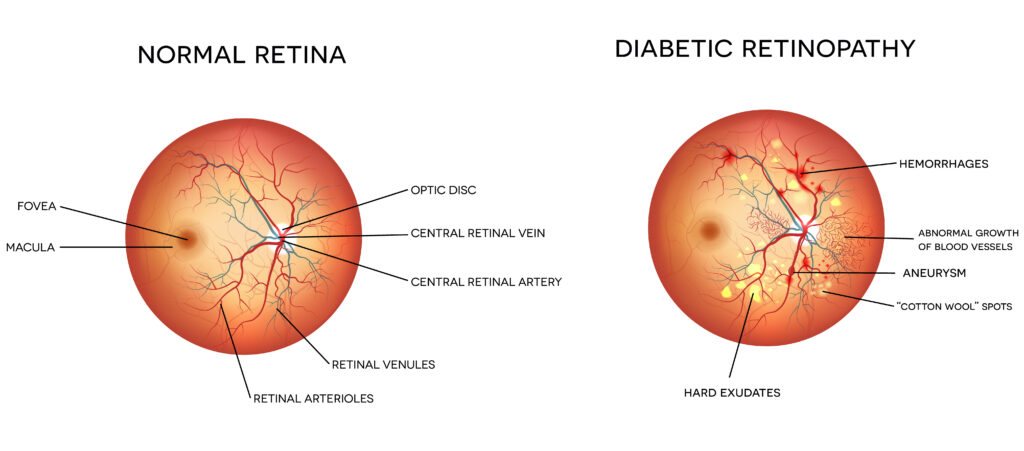Diabetic Retinopathy

What is Diabetic Retinopathy?
Diabetic retinopathy is an eye condition that can affect people with diabetes.
According the American Academy of Ophthalmology, diabetic retinopathy is an eye condition that can develop in people with diabetes when their blood sugar is too high. When this happens it can cause blood vessels in the retina to leak or swell. They may also close, preventing any blood from passing through the retina. Diabetic retinopathy may also lead to the development and growth of new, abnormal blood vessels in the retina. These new blood vessels are weaker than those that usually inhabit the retina and may cause vision issues.
Stages of Diabetic Retinopathy
There are two stages of diabetic retinopathy: non-proliferative and proliferative diabetic retinopathy.
Non-Proliferative Diabetic Retinopathy
Non-proliferative diabetic retinopathy is the earliest stage of diabetic retinopathy. During this stage blood vessels in the retina may close off, making it impossible for blood to reach the macula. If this occurs, exudates can form in the retina, affecting your ability to see.
Proliferative Diabetic Retinopathy (PDR)
Proliferative diabetic retinopathy is the later and more advanced stage of diabetic retinopathy. PDR occurs when the retina begins developing new blood vessels, a process called neovascularization. During neovascularization, new and more fragile blood vessels may bleed and leak into the vitreous. The new blood vessels can not only form scar tissue but can also significantly affect your ability to see. Those with PDR may lose both their central and peripheral vision.

Treating Diabetic Retinopathy
For patients with diabetic retinopathy, Center for Sight offers the following treatment options:
Anti-VEGF Injections
Anti-VEGF injections treat vascular endothelial growth factor (VEGF). VEGF is a protein that cells in your body produce that creates new blood vessels. Diabetic retinopathy causes the growth of abnormal blood vessels. These blood vessels harm your vision and eyes.
Receiving anti-VEGF injections can slow your body from creating more abnormal blood vessels in the eye. You’ll usually need several anti-VEGF treatments to see optimal results, which your ophthalmologist at Center for Sight will review with you.
Laser Surgery
Laser surgery is another treatment option your ophthalmologist may recommend if you have leaking blood vessels due to diabetic retinopathy. Laser surgery helps to seal off these leaking blood vessels, reducing swelling in the retina, shrinking blood vessels and preventing them from regrowing. More than one treatment may be necessary to receive optimal results.
Vitrectomy
For more advanced cases of proliferative diabetic retinopathy, you may need a procedure called vitrectomy. During this effective procedure your surgeon will remove blood from leaking blood vessels and possibly scar tissue to help improve vision.
To learn more about diabetic retinopathy request an appointment at Center for Sight.
